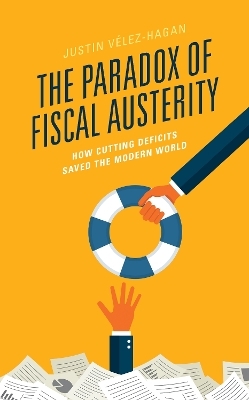
The Paradox of Fiscal Austerity
How Cutting Deficits Saved the Modern World
Seiten
2021
Lexington Books (Verlag)
978-1-4985-7195-1 (ISBN)
Lexington Books (Verlag)
978-1-4985-7195-1 (ISBN)
When financial crises initiated a global recession in 2008, massive public debt forced policymakers in the developed world to impose tough fiscal consolidations to counter growing deficits. The most effective solutions, however, were often the ones most counterintuitive and least politically feasible, catching policymakers in a fiscal paradox.
If governments followed the optimal fiscal policy path, surpluses in good times would counter necessary deficits during economic downturns, leading to worldwide balance. The world, however, has chosen to go in a different direction in recent decades, avoiding thrift in light of a decidedly more indebted future. When financial crises kicked off a global recession in 2008, the spotlight placed on countries’ fiscal conditions put pressure on policymakers around the globe to find a way to slow the growth of deficits and debt by imposing fiscal consolidations (or, more simply, austerity). How have these policies fared across the developed world? Were they even necessary to begin with? This book examines the many factors that have contributed to the success (or failure) of such policies, including timing, magnitude, accompanying policies, composition, and more, while explaining the economic rationale behind their choices.
If governments followed the optimal fiscal policy path, surpluses in good times would counter necessary deficits during economic downturns, leading to worldwide balance. The world, however, has chosen to go in a different direction in recent decades, avoiding thrift in light of a decidedly more indebted future. When financial crises kicked off a global recession in 2008, the spotlight placed on countries’ fiscal conditions put pressure on policymakers around the globe to find a way to slow the growth of deficits and debt by imposing fiscal consolidations (or, more simply, austerity). How have these policies fared across the developed world? Were they even necessary to begin with? This book examines the many factors that have contributed to the success (or failure) of such policies, including timing, magnitude, accompanying policies, composition, and more, while explaining the economic rationale behind their choices.
Justin Vélez-Hagan is economic policy researcher at University of Maryland, Baltimore County.
Chapter One: Disaster & Debt
Chapter Two: How Did We Respond
Chapter Three: What We [Think We] Knew, Before We Didn’t Know
Chapter Four: How’d it All Work Out?
Chapter Five: It’s All Political
Chapter Six: Hellenic Hellions or Heroes of Hellas?
Chapter Seven: The Enchanted (and indebted) Island of Puerto Rico
Capter Eight: Nipponomics
Chapter Nine: The Paradox of Argentine Austerity
| Erscheinungsdatum | 23.06.2021 |
|---|---|
| Verlagsort | Lanham, MD |
| Sprache | englisch |
| Maße | 154 x 218 mm |
| Gewicht | 358 g |
| Themenwelt | Geschichte ► Teilgebiete der Geschichte ► Wirtschaftsgeschichte |
| Sozialwissenschaften ► Politik / Verwaltung ► Staat / Verwaltung | |
| Wirtschaft ► Allgemeines / Lexika | |
| Wirtschaft ► Volkswirtschaftslehre ► Wirtschaftspolitik | |
| ISBN-10 | 1-4985-7195-6 / 1498571956 |
| ISBN-13 | 978-1-4985-7195-1 / 9781498571951 |
| Zustand | Neuware |
| Informationen gemäß Produktsicherheitsverordnung (GPSR) | |
| Haben Sie eine Frage zum Produkt? |
Mehr entdecken
aus dem Bereich
aus dem Bereich
Macht und Herrschaft im Zarenreich
Buch | Hardcover (2024)
C.H.Beck (Verlag)
49,90 €


